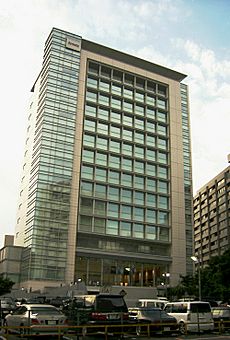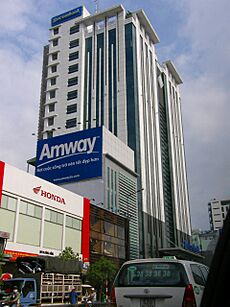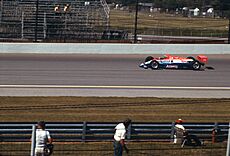Amway facts for kids
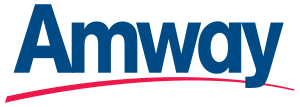 |
|
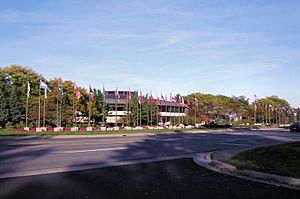
Headquarters in Ada, Michigan
|
|
| Private | |
| Industry | Multi-level marketing |
| Founded | November 9, 1959 |
| Founder | |
| Headquarters | Ada, Michigan, United States |
|
Area served
|
Worldwide |
|
Key people
|
|
| Products |
|
| Brands | Amway Home, Glister, G&H, Nutrilite, Artistry, AmwayQueen, eSpring, Atmosphere, XS Energy |
| Revenue | US$ 8.1 billion (2022) |
|
Number of employees
|
15,000+ |
| Parent | Alticor |
Amway Corp. (which stands for "American Way") is a company from the United States. It sells products for health, beauty, and home care. Amway uses a special way of selling called multi-level marketing (MLM). The company started in 1959. Its founders were Jay Van Andel and Richard DeVos. Amway's main office is in Ada, Michigan. In 2019, Amway and its related companies under Alticor made $8.9 billion in sales. It is known as the biggest multi-level marketing company in the world based on how much money it makes. Amway does business in over 100 countries and places around the world.
Amway has faced questions in different countries about its business model. Some people have wondered if it works like a pyramid scheme. The company has paid money to settle these concerns. For example, in 1983, Amway had to pay a fine in Canada for issues with how it valued goods it brought into the country. In India, there were rulings about its business practices. In 2022, India's Enforcement Directorate took action, saying Amway's business model was like a pyramid fraud.
Contents
Amway's Story
How Amway Started
Jay Van Andel and Richard DeVos were friends since they were kids. They worked together on many projects. These included a hamburger stand and an air charter service. In 1949, they learned about Nutrilite Products Corporation. This was from Van Andel's cousin, Neil Maaskant.
DeVos and Van Andel became distributors for Nutrilite food supplements in August 1949. They sold their first product the very next day. After attending a seminar, they decided to focus on the Nutrilite business. They quickly grew their sales.
Earlier in 1949, DeVos and Van Andel had a company called Ja-Ri Corporation. They used it to import wooden goods. After the seminar, they changed Ja-Ri into a Nutrilite distributorship. Nutrilite offered commissions not just on products sold, but also on sales made by new distributors. This system is called multi-level marketing.
By 1958, DeVos and Van Andel had a team of over 5,000 distributors. But they had worries about Nutrilite's future. So, in April 1959, they started the American Way Association, or Amway. Their goal was to support distributors and find more products to sell.
Their first product was a cleaner called Frisk. They bought the rights to make and sell it. Later, they renamed it LOC (Liquid Organic Cleaner). They then created Amway Sales Corporation to handle products and sales. Amway Services Corporation managed benefits for distributors. In 1960, they bought part of the company that made LOC. They renamed it Amway Manufacturing Corporation. In 1964, these Amway companies joined together to form Amway Corporation. Amway later bought Nutrilite completely in 1994.
Amway Around the World
Amway started expanding to other countries in the 1970s. It went to Australia in 1971 and parts of Europe in 1973. Asia followed in 1974, and Japan in 1979. Latin America joined in 1985, and Thailand in 1987. China opened in 1995, and Africa in 1997. India and Scandinavia started in 1998. Amway also expanded to Ukraine in 2003, Russia in 2005, and Vietnam in 2008.
In 2014, Amway worked with Alfa-Bank in Russia. They created a loyalty card program called "Alfa-Amway." Forbes magazine ranked Amway as the 42nd largest private company in the U.S. in 2018. It was also the top company on the Direct Selling News Global 100 list that year.
Quixtar and Amway Global
In 1999, Amway's founders created a new main company called Alticor. They also started new companies. One was Quixtar, which focused on online sales. Another was Access Business Group, which handled making and shipping products.
The big change with Quixtar was that "Independent Business Owners" (IBOs) could order products online directly from Amway. Products were shipped right to their homes. The Amway name was still used in other parts of the world. Most Amway distributors in North America switched to Quixtar. Because of this, Amway North America closed after 2001. In 2007, Alticor announced that the Quixtar brand would slowly be replaced. The goal was to have one Amway brand (Amway Global) worldwide.
Amway's Global Reach
As of 2011, Amway worked in over 100 countries and areas. These were grouped into regions like the Americas, Europe, and Asia. Amway's biggest markets include China, Korea, the United States, and Japan. In 2008, Alticor said that two-thirds of its markets had more sales. This included strong growth in China, Russia, Ukraine, and India.
Amway in China
Amway China started in 1995. In 1998, the Chinese government banned all direct selling companies. This happened after problems with illegal pyramid schemes. After talks, companies like Amway were allowed to keep operating. They did this through retail stores and independent salespeople.
China brought in new direct selling laws in 2005. In 2006, Amway was one of the first companies to get a license to restart direct sales. However, the law has some rules. For example, teachers and doctors cannot be direct sales agents. Also, salespeople in China cannot get commissions from sales made by people they recruit.
In 2006, Amway China had 180,000 sales representatives. It also had 140 stores and $2 billion in sales each year. By 2008, China was Amway's largest market. It had 28% growth and sales of $2.5 billion. In 2010, Amway had 237 retail shops in China. It also had 160,000 direct sales agents and $3 billion in revenue. Amway has continued to grow in China. It even launched a WeChat mini-program in 2021.
Amway Products and Brands
Amway's product line grew over time. After LOC, they added SA8 laundry detergent in 1960. Then came Satinique hair care in 1965. The cosmetics line Artistry was added in 1968.
In 2018, nutrition and wellness products made up 52% of Amway's total sales. Beauty and personal care products were 26% of sales.
Household Cleaners
Amway is well-known for its original multi-purpose cleaner, LOC. Other popular products include SA8 laundry detergent and Dish Drops dishwashing liquid. In 2010, Consumer Reports tested detergents. Amway's Legacy of Clean detergents were ranked 9th and 18th out of 20. The program manager suggested that consumers could find better-performing products for less money at grocery stores.
Health and Beauty Products
Amway has many health and beauty brands. These include Artistry, Satinique, and Glister. Nutrilite is another big brand, known as Nutriway in some countries. Other brands are eSpring, Atmosphere, and iCook. They also have XS Energy drinks.
Artistry Beauty Products
Amway's Artistry products include skin care, makeup, and anti-aging creams. In 2011, Artistry brand sales reached $2.8 billion.
Nutrilite Supplements
Amway's biggest-selling brand is Nutrilite. This line offers health supplements. In 2008, Nutrilite sales were over $3 billion globally. In 2001, NSF International gave its first certifications to Nutrilite products.
In 2011, Nutrilite vitamins and supplements led Amway's sales. They totaled almost $4.7 billion. According to Euromonitor International, Nutrilite was the world's top-selling vitamin and supplement brand in 2014. In 2015, it was reported that Nutrilite was the largest vitamin and supplement seller in China. It had 11% of a market worth $15.6 billion. A survey in 2015 also found Nutrilite to be the most popular vitamin and supplement brand in China.
In January 2009, Amway announced a voluntary recall of some Nutrilite and XS Energy Bars. This was because they might have used ingredients that were contaminated. The company said it had no reports of anyone getting sick from the products.
In 2012, the Center for Science in the Public Interest (CSPI) questioned Amway's claims about some Nutrilite products. Amway said its claims were correct. However, it agreed to review the statements CSPI questioned. CSPI later reported that Amway agreed to change product labels by the end of 2014.
eSpring Water Filters
Amway introduced its eSpring water filter in 2000. Amway says it was the first system to combine a carbon block filter and ultraviolet light. It also had electronic monitoring. It was the first home system to get certain certifications. Amway also claims eSpring is certified for many potential contaminants, including lead and mercury.
In 2007, Consumer Reports ranked eSpring fifth out of 27 water filter brands.
XS Energy Drinks
On January 14, 2015, Amway bought XS Energy. This is a brand of energy drinks and snacks from California. XS Energy had been sold as an Amway product since 2003. By January 2015, it was sold in 38 countries. It made $150 million in sales each year. According to Euromonitor International, XS Energy was the first sugar-free energy drink brand sold worldwide.
Ditto Delivery Service
Ditto Delivery is a program by Alticor. It's an automatic monthly service. It delivers the same items a customer has ordered before. As of May 2001, Ditto Delivery made up 30% of Quixtar's sales in North America.
How Amway's Business Works
Amway uses a mix of direct selling and a multi-level marketing plan. Amway distributors are called "independent business owners" (IBOs). They can sell products directly to customers. They can also invite and guide other people to become IBOs. IBOs can earn money in two ways. First, they get a profit from selling products themselves. Second, they get a bonus based on the total sales made by them and the IBOs they have sponsored. People can also sign up as IBOs just to buy products at lower prices.
Harvard Business School called Amway "one of the most profitable direct selling companies in the world." They noted that Amway's founders achieved success through a system where distributors earned money from their own sales and from sales made by distributors they recruited.
Sports Partnerships
In the late 1980s and early 1990s, Amway supported racing driver Scott Brayton. He competed in the CART IndyCar championship.
In December 2006, Alticor got the naming rights for the Orlando Magic's basketball arena. The Orlando Magic team is owned by the DeVos family. The arena was renamed the Amway Arena. A new arena, the Amway Center, opened in 2010. Amway held the naming rights for the new arena until December 2023.
In 2009, Amway Global signed a deal with the San Jose Earthquakes Major League Soccer team. They became the jersey sponsor for three years. In March 2009, Amway Global also signed a deal with the Los Angeles Sol of Women's Professional Soccer. This deal lasted one year. In 2011, Amway became a main sponsor for the National Hockey League's Detroit Red Wings for three years.
Amway and Public Life
Supporting Political Groups
In the 1990s, Amway and its sales team gave a lot of money to the Republican Party (GOP). They also supported election campaigns for many GOP candidates. For example, Amway and its distributors gave a lot of money to the 1994 campaign of Republican congresswoman Sue Myrick.
In October 1994, Amway made a very large donation to a political party. It gave $2.5 million to the Republican National Committee (RNC). This was the biggest corporate donation to a political party for a single election at that time. In the 2004 election, Amway gave $4 million to a conservative political group.
In July 1996, Amway co-founder Richard DeVos was honored at a fundraiser for the Republican Party. A week later, it was reported that Amway tried to donate money to pay for Republican TV ads. But they stopped when others criticized the donation.
In April 1997, Richard DeVos and his wife, Helen, gave $1 million to the RNC. This was a very large donation at the time. In July 1997, some lawmakers added a special rule to a tax bill. This rule gave Amway and four other companies a tax break on their Asian businesses. This tax break was worth $19 million.
A 1998 study found that Amway and its founding families had given at least $7 million to GOP causes over ten years. Dick DeVos, son of Amway founder Richard DeVos, was the Finance Chairman of the Republican National Committee. His wife Betsy DeVos was the chair of the Michigan Republican Party for several years. Betsy DeVos later served as the United States Secretary of Education from 2017 to 2021.
Business Model Concerns
Amway combines direct selling with a multi-level marketing strategy. This means distributors sell products and can also recruit others to sell. They earn money from their own sales and from the sales of the people they recruit.
Some people have called Amway a "legal pyramid scheme." They say that many distributors do not make much money. The Federal Trade Commission (FTC) looked into Amway in 1979. The FTC found that Amway was not a pyramid scheme based on their rules. This was because distributors were not paid just for recruiting. Also, distributors were not forced to buy large amounts of products they couldn't sell. They also had to make retail sales. And the company had to accept returns of extra products.
However, the FTC did find that Amway had problems with setting prices and making big promises about how much money distributors could earn. Amway was told to stop these practices. They also had to tell people that more than half of distributors did not make any money. The average distributor made less than $100 per month.
Concerns in India
In September 2006, police in India started looking into Amway distributors. They claimed the company broke laws about "money circulation schemes." They closed Amway offices and warehouses in some states. In 2008, the state government of Andhra Pradesh banned Amway advertisements.
In 2011 and 2012, police in Kerala, India, sealed Amway offices and seized products. They were looking into "money chain activities." In 2013, William S. Pinckney, a top Amway India executive, was arrested. He was accused of running a pyramid scheme. He was later released on bail. In 2017, a court in India brought charges against two Amway India directors. This was based on a complaint from 2002. In April 2022, the Enforcement Directorate in India took action against Amway India. They seized assets worth about $97 million. They said Amway's business model was a pyramid fraud.
Settlement in the U.S.
In November 2010, Amway agreed to pay $56 million to settle a lawsuit in the U.S. This lawsuit claimed fraud and that the company operated as an illegal pyramid scheme. Amway said the settlement was not an admission of wrongdoing. However, they did make changes to their business operations because of the lawsuit. The total value of the settlement, including business changes, was $100 million.
Efforts to Change Regulations
Some people connected to Amway supported a change to U.S. law in 2018. This change would have made it harder for the FTC to investigate if multi-level marketing companies were pyramid schemes. This proposed change was opposed by many consumer groups.
Other Business Matters
Canadian Tax Issues
In 1982, Amway's co-founders and an executive were accused in Canada of not reporting the full value of goods they brought into the country. They were said to have avoided paying over $28 million in taxes and duties. In 1983, Amway and its Canadian company admitted to customs fraud. They paid a fine of $25 million CAD. This was the largest fine ever in Canada at that time. In 1989, the company settled the remaining customs duties for $45 million CAD.
Music Copyright Case
In 1996, the Recording Industry Association of America (RIAA) sued Amway and some distributors. They claimed that copyrighted music was used on training videos without permission. Amway said it was a misunderstanding by distributors. The company settled the case for $9 million.
Amway in the UK
In 2007, Amway's business in the United Kingdom and Ireland was paused. This was after an investigation by the UK government. The government wanted to ban Amway. They said the company used misleading marketing and gave too high earnings estimates. They also said distributors were pushed to buy expensive "motivation and training" tools. In 2008, a UK judge dismissed the government's claims. The judge said Amway had made big changes in the past year. These changes included banning motivational events and materials not approved by Amway. However, the judge also believed that Amway had allowed "misrepresentations" by independent sellers in the past.
Film in Poland
In 1997, Amway Poland sued the makers of a Polish film called Welcome to Life. They claimed the film was unfair and broke copyright rules. The film was said to show intense "pep rallies" and describe recruitment methods that seemed confusing. The film was banned for 12 years while the lawsuit went on. In 2012, a court ruled that the film could be shown. But the makers had to remove "untrue information." This included claims that a large part of Amway's income came from selling training materials.
Dr. Phil and Supplements
In 2004, TV personality Phil McGraw (Dr. Phil) stopped selling his "Shape Up" supplements. This happened during an investigation by the U.S. Federal Trade Commission (FTC). The supplements were made by a company related to Amway. The FTC later dropped its investigation. But in 2005, a lawsuit was filed against Dr. Phil. People who used the products said they didn't help with weight loss. In 2006, a $10.5 million settlement was reached. Amway agreed to provide cash and Nutrilite products to those who were unhappy with Shape Up.
Procter & Gamble Lawsuit
Some Amway distributors spread a false story about the old Procter & Gamble logo. They claimed it was a bad symbol. Procter & Gamble said that some Amway distributors were spreading this story in the 1990s. They sued several independent Amway distributors and the company for spreading false information. By 2003, all claims against Amway and its distributors were dismissed. However, in 2005, a court reversed part of the decision against four distributors. In 2007, a jury awarded Procter & Gamble $19.25 million in damages from these four former Amway distributors. The case was officially settled in 2008.
Rules in Vietnam
In January 2017, Vietnam's Ministry of Industry and Trade found that Amway Vietnam had broken federal rules. This was for doing multi-level marketing without proper authorization.
|
More to Explore
- List of multi-level marketing companies
- Morrison v. Amway Corp.
Books About Amway
- American Victory: The Real Story of Today's Amway, published April 1997 by Chapel & Croft Publishing; ISBN: 0-9645171-6-7
- Amway: The Cult of Free Enterprise, published December 1, 1985, by South End Press; ISBN: 0-9648795-1-4
- Amway Forever: The Amazing Story of a Global Business Phenomenon (), published August 2011 by John Wiley & Sons; ISBN: 978-0-470-48821-8
- Amway: The True Story of the Company That Transformed the Lives of Millions, published September 1, 1999, by Berkley Publishing Group; ISBN: 0-425-17040-3
- An Enterprising Life, published 1998 by HarperCollins; ISBN: 0-88730-997-6
- An Uncommon Freedom: The Amway Experience and Why It Grows, published 1982 by Revell; ISBN: 978-0800713058
- Commitment to excellence: The Remarkable Amway Story, published 1986 by Benjamin; ISBN: 0-87502-136-0
- Compassionate Capitalism: People Helping People Help Themselves, published September 1994 by Penguin Books; ISBN: 0-452-27051-0
- Empire of Freedom: The Amway Story and What It Means to You, published September 3, 1997, by Prima Lifestyles; ISBN: 0-7615-1088-5
- How to Be Like Rich DeVos: Succeeding with Integrity in Business and Life, published 2004 by Health Communications, Inc; ISBN: 0-7573-0158-4
- The First Eleven: The Growth of Amway in Britain Through the Lives of Its Local Heroes, published 1984 by AM Publishing; ISBN: 0-9509593-0-8
- Promises to Keep: The Amway Phenomenon and How It Works, published 1986 by Berkley Books; ISBN: 0-425-09856-7
- The Direct Selling Revolution: Understanding the Growth of the Amway Corporation, published 1993 by WileyBlackwell; ISBN: 978-0-631-19229-9
- The Possible Dream: A Candid Look At Amway, published 1977 by Revell; ISBN: 0-8007-0857-1
- Profiles of the American Dream: Rich DeVos and Jay Van Andel and the Remarkable Beginnings of Amway, 1997 by Premiere Films
See also
 In Spanish: Amway para niños
In Spanish: Amway para niños
 | Kyle Baker |
 | Joseph Yoakum |
 | Laura Wheeler Waring |
 | Henry Ossawa Tanner |


